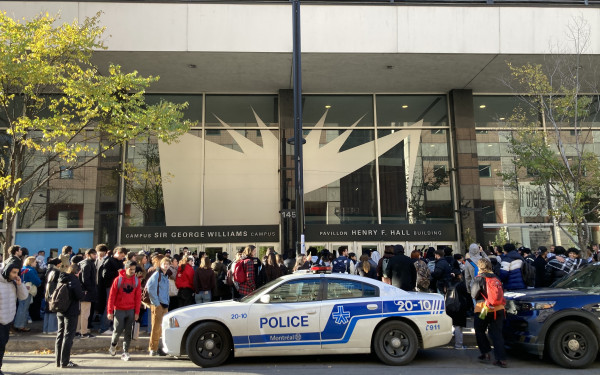Students picket and take over Hall building on first day of strikes
Over two dozen students were picketing classes and hundreds rallied in front of the Hall building
Nov. 21 marked the first day of an international university strike movement for Palestine.
The strikes were organized by 11 Concordia University student associations and one faculty association on campus, comprising over 11,000 students across Concordia. Across Montreal, 85,000 students are striking on Nov. 21 and Nov. 22.
Strikes and picketing
The morning strikes started as early as 8 a.m., with groups of students dispatching from Le Frigo Vert to different classes across the Sir George Williams campus.
Pickets were peaceful, and most of the picketed classes were successfully cancelled on-site or beforehand by professors. For soft-picketed classes, picketers entered classrooms and encouraged students to join the movement.
Police presence was minimal in the morning, with few police cars surrounding the campus.
According to Danna Ballantyne, external affairs and mobilization coordinator at the Concordia Student Union, these strikes are a denunciation of violence.
“They are meant to show the administration that we don’t want any part in the violence they are taking part in,” Ballantyne said, referring to Concordia’s recent increase in police on campus, which had led to four student arrests.
Rally at Hall building
The student movement grew more active at 2 p.m. for a “Support the Strike” rally organized by Solidarity for Palestine’s Honour and Resistance (SPHR), as an extension of the overall day of strikes. The demonstration started off with around 100 people, who were joined by several hundred students from Dawson College and McGill University 10 minutes into the rally.
Before the rally, SPHR and student associations had made their strike demands public. Their demands include: for Concordia to publicize their full investment portfolio; for the university to seize all employment partnerships with military companies; for the university to publically condemn the genocide in Gaza; for the university to prohibit police presence on campus; and for the administration to “stop its repression campaign on students.”
The demonstration began with chants from SPHR organizers demanding that the university divest.
According to Zeyad Abisaab, ex-general coordinator of SPHR and current Palestinian Youth Movement member, the student movement has grown too strong for the university.
“Today, as we see, is a historic day for the student movement. 11,000 students are on strike at Concordia, 11,000 students saying they do not want to be complicit with Israel, 11,000 students demanding that Concordia cut ties with weapons companies,” Abisaab said. “Concordia has ignored these demands.”
On Nov. 19, two days before the strikes, Concordia had sent out an email to students asking for peaceful strikes and for all students to renounce violence.
“Every Concordian has the right to study and work without fear of experiencing physical violence, witnessing vandalism or being the target of harassment. As a community, we must agree that attacks on people and property are simply unacceptable and cannot be tolerated,” the email stated.

Soon after students joined the rally, demonstrators entered the Henry F. Hall building, where four Concordia Safety and Prevention Service (CSPS) officers were blocking the entrance.
Despite CSPS officers’ attempts at restraining students from entering the Hall building, students made their way inside to the main floor, chanting “Free, free Palestine.”
Demonstrators stayed on the main floor for roughly 20 minutes, chanting, waving Palestinian flags and demanding the university divest from genocide.
For many participants, the strike represented both a personal and collective stand.
“Knowing I can have an impact means a lot,” Concordia student Kris Wachniak said. “Look at how many people showed up to express solidarity, it’s truly moving.”
Wachniak was not the only student feeling this way.
“Thousands of us are supporting this strike for a reason,” said a student who wanted to keep their name anonymous for fear of academic repercussions. “Our governments and schools do nothing. It sits on my conscience to know my money is funding these war machines.”
At 2:43 p.m., Concordia sent out an emergency alert to students, encouraging them to avoid the area in and around the Hall building and to evacuate if they felt they needed to.
Five minutes before Concordia’s mass email, students had started moving up the floors of the Hall building, continuing their demonstration.
In big groups, students walked up the escalators, banging on the sides, ringing bells and chanting slogans like “Disclose, divest, we will not stop we will not rest.”

Around 3:00 p.m., protesters exited the Hall Building and gathered briefly outside before beginning a march down De Maisonneuve Blvd. W. towards Guy St., eventually circling back to Mackay St. Protesters carried signs, flags and a large cardboard cutout of Concordia President Graham Carr.
While most of the strike remained focused on calls for divestment and solidarity with Palestine, a smaller pro-Israel group gathered nearby at the intersection of Mackay St. and De Maisonneuve Blvd. W., surrounded by SPVM officers. Despite tensions, no altercations occurred, though both groups exchanged chants.
No arrests were made on campus.







